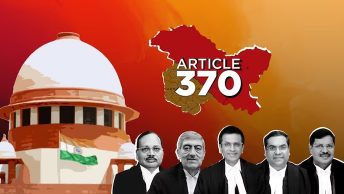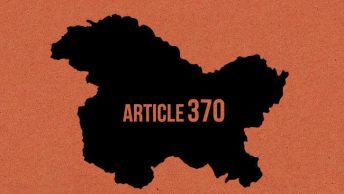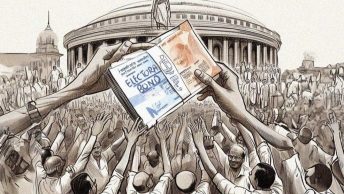Summary: The arguments for Day 5 continued the thread regarding the special status of the state in light of Article 370, with Sr. Adv. Zaffar Shah concluding his arguments and Sr. Adv Rajeev Dhavan starting his for the petitioners.
The Special Case of J&K
The arguments on the fifth day of hearings began on account of the ‘special’ nature of J&K. Sr. Adv. Zaffar Shah submitted that J&K has a separate constitution due to both the Instrument of Accession (“IoA”) and the Proclamation of 1948. Whatever remaining powers of the Maharaja were left under this were subsumed under Article 370, of which the power to legislate was not one; the state of J&K itself retained it. The word ‘concurrence’ used in Article 370 highlights that the concurrence of the people of J&K must be sought via the council of ministers. Shah submitted that the state retained its constitutional autonomy after signing the IoA. As there was no merger agreement, autonomy had to be maintained. The President and the Union Government cannot make laws for J&K without consulting the State. Justice Kaul then asked Shah if the government of J&K wanted all the provisions of the Constitution to be adopted. The question here is whether the process followed was flawed or not.
The Genesis of Article 370
Mr. Shah submitted that except Article 370, no part of the Constitution applies to J&K. He explained the genesis of the provision itself. The first part of the provision talks about the application of laws. He describes it as a “donation,” which was extended in terms of IoA from the Maharaja to the Union. Apart from defense, communication, and foreign affairs, no donation would extend. The word ‘concurrence’ has been used for the agreement of both parties regarding the entry under which the parliament had the power to make laws. Thus, a parliamentary law cannot be extended unless an entry is made applicable against it. The limitations Article 370 imposed regarding any subject in List I or List III, subjects not covered by IoA, then the state’s concurrence becomes necessary. Constitutionally speaking, thus, there is no power vested in the Central Government or in the President to make any laws in this State.
The Question of Revocation
Shah submitted that the only body with the power to revoke Article 370 is the Constituent Assembly of J&K, which is no longer in existence – the solution for this would only be to sign a merger agreement and revoke the IoA and Article 370. The CJI, however, intervened to point out that the surrender to India was an absolute one and not a conditional surrender of the sovereignty of J&K. He also pointed to the State List, which enumerate subjects on which the Parliament may not legislate, without detracting from the sovereignty of the nation itself. CJI Chandrachud highlights that concurrence is not unique only to the relationship of the Union with J&K. There are various shades of concurrence required in the Constitution, and it does not affect the sovereignty of the Union.
Shah replied that the constitutional autonomy of the state of J&K had been taken away, pointing to the 1927 Hereditary State Subject Order and other modifications carved out in applying laws in J&K that give it constitutional autonomy.CJI asked Shah to apprise the Bench about the key provisions of the Constitution to which exceptions still existed about J&K on the eve of the promulgation of the Constitution (Application to Jammu and Kashmir) Order 2019 before the bench rose for lunch.
Extending the Indian Constitution to J&K?
When the Bench reconvened post lunch, Mr. Shah pointed out that the Constituent Assembly of India believed that the State’s Constituent Assembly would put forward the recommendation of application of the Indian Constitution to J& K and that the Assembly proceeded with that assumption till 1957. He noted that the Constitution of J&K has been formed based on the power vested with the people under the proclamation of Maharaja, people under the IoA, and the letter of 27 October 1947. As the provisions of the J&K Constitution cannot be made a part of the Indian Constitution, those provisions in conflict were held to be inapplicable to J&K.
On what the Constituent Assembly had ensured, Mr. Shah raised two points. Firstly, it ensured that J&K shall still be an integral part of India. Secondly, the Indian Constitution shall be made applicable to J&K as well. Mr. Shah explained that Article 370 and its explanation defines the government of a State. While a government can exist without a Council of Ministers, he pointed out that this Article envisages a state government that is advised and aided by the Council of Ministers. He stated that while making recommendations to the President, the Governor will exercise the power as the Head of the State. Further, the President of India would assume powers as the Governor under both the Constitutions of India and J&K.
Governor’s Constitutional Misconduct
Mr. Shah alleged that the Governor of J&K is guilty of severe constitutional misconduct. While the Governor is supposed to uphold the State’s Constitution, the Governor has destroyed the Constitution of J&K by recommending and applying the Indian Constitution to the State. This, he argued, is a breach of his oath. Though the State is under the President’s rule, it is pertinent to note that the President had assumed the powers as the Governor under the Presidential notification and the Governor under the Constitution of Jammu and Kashmir.
Mr. Shah raised that to understand Article 370, one must see beyond the purpose and purposive interpretation of its existence. He termed the self-abrogation of Article 370 a ‘suicide’ and self-killing, which was not permissible. In this regard, the CJI queried whether the counsel’s arguments could be crystallized. Mr. Shah raised four points:
- The Constitution (Application to Jammu and Kashmir) Order, 2019, C.O. 272 was notified when the presidential order when Article 356 was in operation.
- Under a notification dated 19 December 2018, the President had assumed powers of Governor of J&K.
- The government would have a Council of Ministers in place as C.O.272 is issued with the concurrence of the J&K government.
- As it had not been done by Constituent Assembly or by the Government of J&K in 69 years, all provisions of the Indian Constitution cannot be made applicable to J&K.
Mr. Shah concluded his arguments by saying that the Article 370 case is the one where the government wants to do something but isn’t able to yet, given the constitutional obstacles. He ended by saying:
“No one sells the country, so all government works for progress…roads are built, etc. When the judgment is dictated, let the words of truth and justice trickle from your mouth.”
Petitioner’s Stance
Sr. Adv. Rajeev Dhavan began his arguments for the petitioners. By stating that India is known for being the most diverse country in the world and that its diversity is reflected in its Constitution, he argued that there are many other articles along with Article 370 where the state legislatures’ concurrence is necessary. He then takes the bench through the texts of Articles 3 and 4 of the J&K Constitution and said that this case is unprecedented when a state is converted into a Union Territory. Further, the diversity is not limited to the special provisions starting from Article 370(1). Even in the cases of Mizoram and Nagaland, the state legislature must act before any customs are interfered with. And for Ladakh, a provision similar to Article 240 will be applicable, and J&K will be a UT with limitations in J&K Reorganization Act. This would be done by conversion through Articles 3 and 4 by a circuitous procedure.
The Bench rose for the day.
Aamuktamalyada Thalluri is a second-year law student at NALSAR.
Harshitha Adari is a third-year law student at NALSAR.
[Ed Note: This post was edited by Aurif Muzafar who is a Kashmiri lawyer and writer and currently a doctoral student at NALSAR. It has been co-edited by Archita Satish and posted by Harshitha Adari from the Student Editorial Team]






